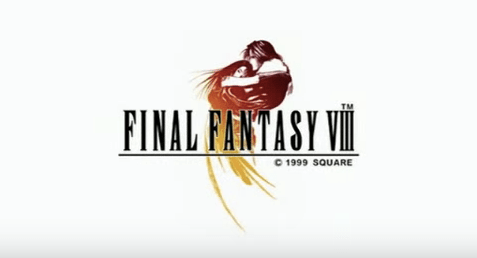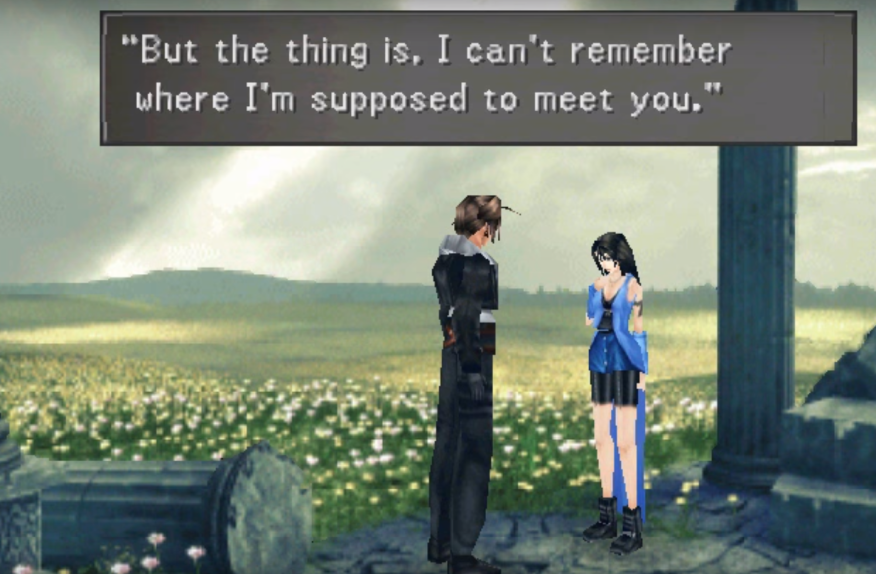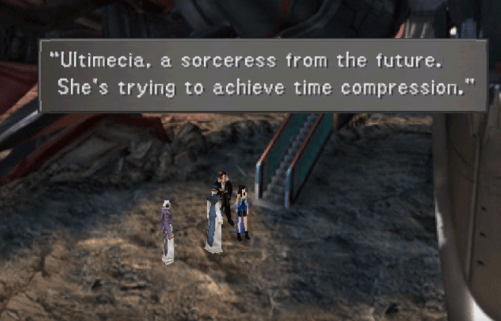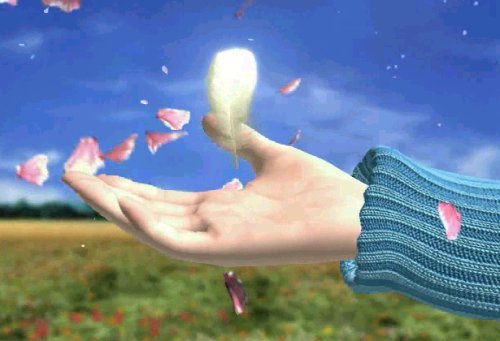Some games just stick with you. As a child, I lived for the vast worlds of Zelda and Final Fantasy. There was a sense of excitement whenever you visited a new town – you never quite knew what to expect. Final Fantasy VIII was an eye-opener for me as a teenager. Each town more glorious and technologically sophisticated than the next, and on top of that, a story rife with plot twists. Once you truly understood the combat system, you could ace every boss under-leveled. I was a fan. I knew every nook and crannie of this world and wrote tons of fan fics about Sorceress Edea. But as the series progressed, FFVIII was framed by fans as one of the weakest titles.
This is a difficult game to master or understand, but I would love to take some time to unpack what I value about the game. At first glance, it may seem like a hot mess, but this is one of the reasons why we love to theorize about it. When you replay it a couple of times, you start to appreciate its themes. Let me tell you what I find clever about this title, and how that relates to themes like memory, identity and time.

First, let’s get this out of the way fast. I won’t defend the whole title. There are a couple of things about the game that I don’t like, and most of them revolve around Squall, who is a douche (I’m sorry Squall, but you are). The romance plot between Squall and Rinoa is iffy, mostly because he is so full of himself and doesn’t care about her at all. The other characters are often overshadowed by this, and get little development.
I won’t even blog about how great this game could have been if it had just been about Laguna. Or Ellone. Or anyone else. I just want to make some notes about the story, which has been theorized about a lot. Most famously, fans speculated that Ultimecia is Rinoa, or that Squall dies at the end of Disc 1. These theories are a bit far-fetched (and have often been refused by the people working on FF, even as recently as 2017), but one thing they drive home well is….
Final Fantasy VIII is a game about time and memory
The most important theme in this game is time. This game has more in common with Majora’s Mask and To The Moon than it does with other Final Fantasy games. The game is a loop – a self-fulfilling prophecy. The end of the game is the starting point of many events. Both Ultimecia and Squall are send back in time to Edea’s house, where Edea receives Ultimecia’s powers and where Squall tells her to found SeeD, thereby creating his own destiny.
Time magic. No one knows quite how it works, but this is the essence of the game, and the most interesting thing to speculate about. We see it spelled out in the intro of the game, which is a flash-forward to the scene in which Rinoa and Squall make a promise about returning to the flower field. ‘I’ll be here. I’ll be waiting for you. If you come here, you’ll find me. I promise.’ The game is much like Inception. When we are lost in time in space, we need a token. Something to hold onto. Time, just like dreams, is a murky and fickle stream of consciousness. We can get lost in alternative dimensions and realities.

But memories in FFVIII, as we know, are ambiguous and full of deception. Both the Guardian Forces as well as Ellone control memories. The control of a Guardian Force is never quite there, since it merges with its user. It sits in the part of your brain where memories are stored and eventually these memories are erased if you keep using the Guardian Forces. We spent half of the game with quasi-protagonists because of this. Flat characters who lost every sense of identity. The game lacks character development and has often been critiqued for this, but it also makes sense that the party members remain superficial. They are broken and forgot their actual dreams and their childhood.
What seems angsty and dumb in Disc 1 gets meaning when replaying the game: Seifer and Squall’s relationship is rooted in a difficult time at the orphanage. Squall’s sadness stems from loosing his sister. Quistis has a long history of being everyone’s big sister. All of this makes sense, and while it shouldn’t be an excuse for a flimsy plot, I also don’t think they could have given much more away. When you write a story about six broken characters with memory loss, who are not aware of their mental illness there is only so much you can do.
Characters want to control and manipulate time
It’s not just the Guardian Forces that manipulate time. The ultimate goal of the game’s villain is to distort time and space, so she can live forever.

Ultimecia tries to achieve “time compression”. This time magic is a complex process but in essence, ‘past, present and future get combined’. She can live in a (pocket) dimension of her own. It is assumed that she goes to the past with junction machine Ellone, a machine that mimics Ellone’s abilities, and that she needs Ellone herself to go further into the past. If she compresses these different time lines through magic, the sorceress can exist beyond time and space (and thus live forever).
When defeated, Ultimecia emphasizes the importance of time as her motive. She wants to hold onto time and live forever in a dimension of her own, but time is fleeting. It cannot be controlled.
Reflect on your… Childhood…Your sensation… Your words… Your emotions…Time, it will not wait…No matter how hard you hold on…it escapes you.
Her words strike me. They are not only about herself, but also reflect what happens to the characters. Their memories were erased by the use of guardian forces. They lost their childhood and their identity. Though they gained ownership over some of the past again, it was a difficult struggle. Ultimecia is the perfect nemesis for them. A villain so obsessed with controlling time (and the past/memories) matches them, since time is exactly what taken from our protagonists as well.

Time cannot be changed, but it can change you
Squall’s sister Ellone has the power to send people to the past. They can, however, never change the past, and can only observe it. They cannot communicate with the people that they observe, but share their consciousness. This is not very different from how a guardian force shares a part of its summoner’s consciousness (the part where memories are stored). People in the past notice it when they are inhabited by someone from the future. Laguna calls these voices ‘faeries’.
Still, you can never truly communicate with people in the past, if you are send there by Ellone. The only one who changes is you, the observer, by what you have seen in the past. Squall changes, for instance, because he meets his father Laguna. ‘You’re the one that changes. Not the past,’ Ellone emphasizes. Still, Ellone has more power than she gives herself credit for. Eventually her powers bring the party to the future, which eventually leads to the time paradox in which Squall makes his own time line possible.
Perhaps the right question is: what is Ellone? Some translations (outside of the official game though) called Ellone a sorceress, but in Japanese, this was never stated. In fact, the story emphasizes how she is unlike a sorceress. Characters like Odine want Ellone, because of how unique Ellone’s powers are. This is also why Ultimecia needs her. These powers are unlike anything they have ever seen, unlike para-magic or the magic of a sorceress.She is a guardian force, I think, or something akin to it. Some of the games summon Espers and Ellone strikes me as one, considering her powers truly are extrasensory perception (ESP). She has a supernatural strength that isn’t magic, but goes beyond the limits of what humans normally do.
Ellone, Rinoa, Ultimecia, Adel – in a way all of them are sides of the same compass. I wouldn’t argue that they are similar characters (as in Rinoa is Ultimecia) but they have something in common. Rinoa may not literally be Ultimecia, but there are interesting parallels between her and the other female characters who are possessed and lack their identity. The sorceress characters, specifically, are often referred to as daughters of Hyne, a God who tricked humans and gave them an essence of his magic. Similar to Cid and Edea’s relationship, Rinoa and Squall have a complicated one as knight and sorceress. ‘Even if you end up as the world’s enemy, I’ll… I’ll be your knight,’ Squall swears.
Time is fleeting (also, the concept of wabi-sabi)
I agree that FFVIII is a difficult game. Even after playing it again for the fifth time, I think, few, what a ride! Still, I think that there is something beautiful about its ambiguity, plot twists and world. It is not perfect, but I think that it has a real heart, and some real truths about growing up, getting older, loosing ourselves, and eventually having to realize the truth.
Time goes by too quickly, and we cannot control it.
The Japanese have a word for this feeling which describes the fleeting beauty of life, namely wabi-sabi or 侘び 寂び. Sakura are considered an example of this fleeting beauty. The moment of full bloom is two days, but in those two days we witness an event of the utmost beauty.

Of course, a game such as FFVIII, which relies so heavily on sakura petals in its opening, reminds me of wabi-sabi very much. I tend to think (certainly during disc 3 and 4) that this one of the themes that it tries to evoke. Remember, in its most emotional moments, the game literally refers to flowers and flower fields to make us consider the passing nature of time and beauty. The allegories in the game are very wabi-sabi – the flower field, the garden, and the SeeD/seeds.
I think that what this story truly tries to tell us is: Nothing lasts. We need to accept that things go by and that they are transient. And in the face of this sad but beautiful reality, we make the most of what we can.
